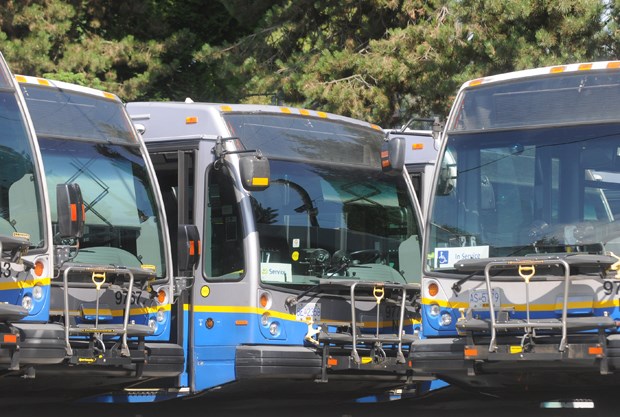With or without a bus strike, commuters are about to see how important transit service is to Metro Vancouver.
As of Monday, Unifor issued 72-hour strike notice after contract talks stalled with Coast Mountain Bus Co., and even if a strike or other job action is averted by Thursday night, expect to see some accommodation for bus drivers because the region simply can’t run without buses.
Though not without flaws, Metro Vancouver’s transit system is recognized as one of the best in North America, and with the strengthening of the SkyTrain system, the backbone of transit — bus ridership — is constantly on the rise.
The number of people taking the bus rose 5.7% in the northeast sector in 2018, including behind the southeast (North Delta, Surrey, Langley and White Rock), which jumped 15.6%, and the southwest (Richmond, South Delta), which increased 8.8%.
System-wide, total boardings — bus, SkyTrain, SeaBus, West Coast Express and HandyDART — went upÌý7.1% in 2018, for the biggest annual increase in the organization's history.
Does Coast Mountain want to lose those gains? Probably not.
What’s at stake? The future of transit.
Without bus service, especially connections to SkyTrain, our transit system becomes truncated, forcing more people to use their cars or come up with other alternatives that will make getting to work, school and appointments more challenging and difficult.
If the service isn’t running, commuters will simply give up, a boon to ride-hailing services, such as Lyft that may roll out to pick up the slack, while the cost to the economy would be great, especially if job action were to last as long as the four months it did in 2001.
Still, there is probably room to move on both sides, though we would never place a bet based on media statements during negotiations because both parties tend to spin and exaggerate.
But there is likely plenty of truth to the union’s concerns about stress on the job and the need to hire more drivers as well as put in service more buses to reduce traffic. The cost of congestion was recently highlighted in a report to the TransLink Mayors' Council, and if we’re serious about transit, we will make the improvements necessary.
It’s also true that Coast Mountain has been on a hiring spree to get buses on the road. It says it has hired more than 1,000 bus drivers in the last two years. That’s good news but the employers’ job doesn’t end with getting bums in seats to drive the buses.
Both sides need to be brought together, with mediation a good step to avert a shutdown, and there needs to be a clear commitment from TransLink, the Mayors' Council, and the provincial government that the funding is there to ensure the reliability of bus service into the future.
Now is not the time to short-change public transit.
Ìý



